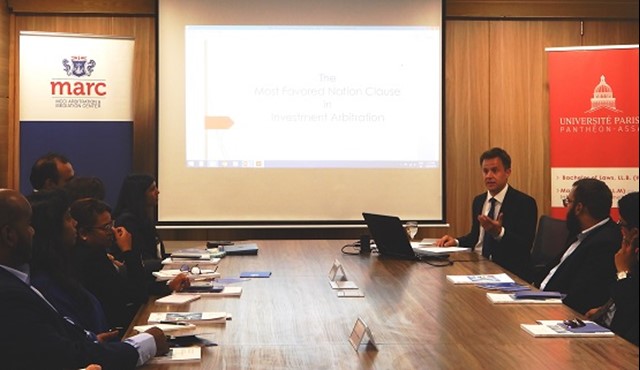Business updates

MARC Seminar with Professor Malik Laazouzi
MARC 23 Apr 2019MARC and the University of Paris II Panthéon-Assas organised a seminar on "The Most Favoured Nation Clause in Investment Arbitration" which was conducted by Professor Malik Laazouzi on Monday 22 April 2019.
The most favoured nation clause constitutes a powerful tool to improve the protection granted to foreign investors engaged in investment arbitration proceedings. Some awards invite to consider the scope of this clause; particularly the way Claimants sometimes invoke it to better—or even create—access to investment tribunals.
This issue was approached in light of the France-Mauritius BIT signed in 1973. Indeed, an interrogation was raised as to whether it is possible to give a right to access investment arbitration through the MFN clause (article 9) by using provisions from more modern BITs, and by doing so, avoiding the outdated provisions on dispute resolution of the 1973 BIT. Even though, arbitration tribunals have in the past granted procedural rights through the MFN clause, it all depends on the specific wording of the clause. Awards have varied considerably on the matter throughout time, and up to now, no specific solution has been found. It is considered that the new BIT signed between France and Mauritius in 2010 will resolve the issue but it has not yet come into force. It is expected that it will provide provisions in favor of investment arbitration and a standing offer of arbitration.
Professor Malik Laazouzi teaches at the University of Paris II Panthéon-Assas (Investment Arbitration and International Commercial Arbitration, Law of International Contracts, Private International Law). He often drafts legal opinions in international arbitration proceedings under ICSID and UNCITRAL Rules but also in arbitration-related proceedings before French courts. Moreover, he often prepares expert reports in international arbitration proceedings under the Rules of the ICC, ICSID and ad hoc (including UNCITRAL). Professor Laazouzi also wrote several books and articles about commercial & investment arbitration and private international law among others.





